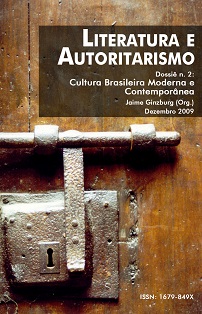The horrible story to be told after August: an analysis of two short stories by Caio Fernando Abreu
DOI:
https://doi.org/10.5902/1679849X74654Keywords:
Caio Fernando Abreu, Depois de Agosto , Linda, uma história horrível , AIDSAbstract
Currently a reference author of Brazilian literature, Caio Fernando Abreu was part of a generation of writers that was repressed by the authoritarianism of the dictatorial government, suffering from censorship and the limitation of freedom of artistic and political expression. Approaching themes such as the uncertainty of life, the fear of death and sex and the approach to AIDS, considered the “gay cancer” in the 80s and of which he was a victim, made one of his short stories, “Linda, uma horrible story” (1988), was included in the anthology The Penguin book of international gay writing in 1995. Within the theme of AIDS, the short story “Linda, a horrible story” (Linda) together with “After August” (1995), published shortly before his death in 1996, will be analyzed here based on aspects of illness, sadness and melancholy of his characters.
Downloads
References
ABREU, Caio F. Os dragões não conhecem o paraíso. São Paulo: Companhia das Letras, 1988.
ABREU, Caio F. Ovelhas negras. Porto Alegre: Sulina, 1995.
ARENAS, Fernando. Utopias of Otherness: nationhood and subjectivity in Portugal and Brazil. Minneapolis: University of Minnesota Press, 2003.
GINZBURG, Jaime. “Memória da ditadura em Caio Fernando Abreu e Luís Fernando Veríssimo. Letterature d’America, v. 113, p. 95-110, 2008.
SCLIAR, Moacyr. Saturno nos trópicos: a melancolia européia chega ao Brasil. São Paulo: Companhia das Letras, 2003.
SONTAG, Susan. AIDS and its metaphors. New York: Farrar, 1989.
SONTAG, Susan. Illness as metaphor. New York: Farrar, 1978.
Downloads
Published
How to Cite
Issue
Section
License
DECLARAÇÃO DE ORIGINALIDADE E EXCLUSIVIDADE E CESSÃO DE DIREITOS AUTORAIS
Declaro que o presente artigo é original e não foi submetido à publicação em qualquer outro periódico nacional ou internacional, quer seja em parte ou na íntegra. Declaro, ainda, que após publicado pela Literatura e Autoritarismo, ele jamais será submetido a outro periódico. Também tenho ciência que a submissão dos originais à Literatura e Autoritarismo implica transferência dos direitos autorais da publicação digital. A não observância desse compromisso submeterá o infrator a sanções e penas previstas na Lei de Proteção de Direitos Autorais (nº 9610, de 19/02/98).






